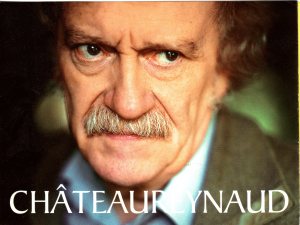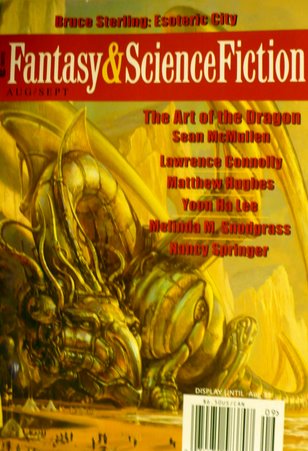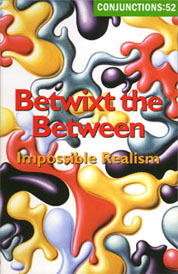June 26th, 2009 § § permalink
I’m a month late in mentioning the 8th annual Imaginales “Festival of Imaginary Worlds†in Épinal (best known for a printmaker that’s sort of the Currier & Ives of France), but luckily enough this year has seen an explosion of a English language blog coverage: Hal Duncan, Cheryl Morgan, and David Anthony Durham especially provide detailed accounts and fun photos. (The con site itself has an English version that, where tourism sites are concerned, only slightly smacks of wonky Anglicization. Monsieur gets to say that ‘coz he’s a snobby translator très littéraire.)
Among the stories nominated for the Prix Imaginales in the Best Short Fiction category were Kelly Link’s “Stone Animals†and two nouvelles by Lionel Davoust. One of these, “L’Île close,†a meta-Arthurian fantasia, took home the prize–CONGRATULATIONS–and will be appearing (translated by yours truly, with wonderful advice from editor Delia Sherman and all this despite the author’s fluency in English) in the Interstitial Arts Foundation’s fall anthology Interfictions 2. Ah yes, this post had you fooled at first, but it is in fact a shill. By hook or by crook, I always end up pushing a book. Which leads us to this shout-out from the IAF:
 We live in a world of niche marketing. The Interstitial Arts Foundation brings artists together to tear those barriers down.
We live in a world of niche marketing. The Interstitial Arts Foundation brings artists together to tear those barriers down.
We are asking you now to join us in our next adventure in storming the barricades: Interfictions 2: a New Anthology of Interstitial Writing, edited by Delia Sherman & Christopher Barzak. Interfictions 2 will be published in November 2009 in collaboration with Small Beer Press.
The first volume of Interfictions, published in 2007, was hailed as “A phenomenal collection…engrossing and provocative†(Hipster Bookclub) that “belongs on the nightstand of anyone interested in the development of contemporary short fiction†(Atlanta Journal-Constitution).
This second volume features original work by a whole new set of writers who joyfully explore the big imaginative spaces between conventional genres. And this time, we’ll be reaching out to even more readers by publishing a series of free stories on the new Interfictions 2 Annex online!
What can you do to help? This extraordinary collection of interstital fiction needs your financial support. We’re asking you to sponsor not just a book, but an idea – the idea that artists need to be able to express themselves freely and directly to their audiences, without the restraints of conventional genre limitations.
Here are some ways you can help us publish Interfictions 2: » Read the rest of this entry «
June 25th, 2009 § § permalink

from the band for L'Autre rive
(UPDATE: It’s been brought to my attention that this photo, from Grasset’s ’07 promo, was taken by Lea Crespi. Apologies for not crediting this incredibly talented photographer, more of whose photos of G.-O. C. can be found here. Her site here.)
…and:

We all know who this is, right?
June 24th, 2009 § § permalink
My dinner listening: at Slate, Daniel Gross interviews Justin Fox on The Myth of the Rational Market: A History of Risk, Reward, and Delusion on Wall Street. I Statler-and-Waldorf my way in italics through a fascinating conversation, snippets of which have been transcribed:
JF: Right at the turn of the century there was this French mathematician who wrote his dissertation on the movements of securities prices on the Paris Exchange, and his formula for representing the randomness of these movements was what later came to be called Brownian motion… so there was this early tie-in that basically Albert Einstein’s description of Brownian motion a few years later helped lead to molecular physics, which helped lead to the atomic bomb.
But the more specific one is, during World War II, these people, Milton Friedman, there were artillery officers flying back in the middle of the Battle of the Bulge to ask Milton Friedman for advice on how to score the artillery shells to balance, basically, risk and reward. It’s how many–if you got more pieces, you’re more likely to hit, if you got bigger pieces, you’re more likely to do damage.
And just a couple of years later, Harry Markowitz, whose–Friedman was on his dissertation committee–wrote this famous portfolio theory, descriptions of how to invest that, in Friedman’s assessment, and I would agree, was basically exactly the same in form as the equations they used to figure out how to score artillery shells.
Well, humanists, horrified yet? Or breaking out in gallows smiles? If you wanted Pynchonesque… Yet on a pure mathemathical plane, this seems like: Duh. » Read the rest of this entry «
June 24th, 2009 § § permalink
Recently, translating a pay piece I didn’t pick, I had what seemed like some new thoughts on an old translator’s conundrum: to alter or not to alter. I tend to take fewer liberties with pieces I don’t pick, because the voice may not speak to me; it’s a glove I don more gingerly. Strange, that interpret should have two meanings and translate only one, and that one imply a one-to-one mapping, as in, “That doesn’t translate.†The professional sense of the terms are still widely confused, and most people (who, on learning what I do for a living, ask “Oh! Have you tried working for the UN?â€) still use them interchangeably, but the distinction seems obvious once drawn—translators write (ghostwrite) and interpreters speak (are ventriloquized); both channel, paraphrase, yet I found myself tempted to tell an editor who asked for sentences somewhat freighted and opaque in an original to be further elucidated, “My job is to translate, not interpret the text.†That is, although the act of translation is one of comprehension, of explaining a text to oneself (indeed, as all reading is the rescuing, mining, or recovery of meaning from a text into one’s own private unarticulated language; to that translation adds periphrasis in a communal tongue) it seems the final translation should not go further in the direction of explication than allowed for in the original. » Read the rest of this entry «
June 24th, 2009 § § permalink
“Être aimé n’entraînait aucun devoir et donnait tous les droits, aimer ne conférait que le droit de souffrir.” ~ Georges-Olivier Châteaureynaud, L’Autre rive
“Aimer sans retour, c’est admettre qu’on se jettera dans le feu pour quelqu’un si l’occasion s’en présente, et que ce sacrifice nous vaudra trois secondes de reconnaissance, suivies d’un oubli pur et simple. Si béjaune qu’on soit, on comprend que l’autre s’accommode fort bien de nos tourments et que la vie lui demeure douce même quand elle nous devient insupportable.” ~ Georges-Olivier Châteaureynaud, Le Château de verre
“Quand on est aimé, on ne doute de rien, quand on aime, on doute de tout.” ~ Colette
June 22nd, 2009 § § permalink

Review issues of the July-August Fantasy & Science Fiction have gone out to bloggers; I’ve just gotten my comps. My thanks to editor Gordon Van Gelder for all his support and enthusiasm for Georges-Olivier Châteaureynaud’s story, “Icarus Saved from the Skies.†He’s opened a thread for comments on the issue here. The latest from him:
Now’s a good time to let your readers know the issue is out—copies should be on the newsstands, while subscribers who sign up for a year of F&SF will still start off with this issue. (If you’re going to encourage people to subscribe, tell them to put a message in their order that you sent them. I’ll give a cookie of some sort to anyone who persuades ten people to subscribe.)
Bloggers are already chiming in! Caren “spitkitten†Gussoff singles out in her review “a translation of a short piece… whose ending has all the punch of a tickle but bowls over in its restraint,†while Aaron M. Wilson at The Soulless Machine Review devotes a post discussing the inevitable Marvel mutant associations the story takes on in an American context, calling it “a train wreck of emotions that sends the winged-narrator over the side of a cliff. Don’t miss it.†Many thanks for the kind words!
The shift in cultural context brings with it an interesting, almost temporal shift in terms of dating subject matter. The notion of the person with powers who just wants to be normal is probably, because of comics, way more played out here than in France, but being normal doesn’t quite carry the same weight in a less markedly conformist society, where the choice is less either/or, the dichotomy between normal and not less damningly clear-cut. The normal lives Americans yearn for often involve some idealized happiness, itemized down to the last possession by our pursuit thereof—Superman’s corn-fed family fantasies, for instance. Many Châteaureynaud protagonists tend to want to be normal in a more retiring, passive, even self-effacing way; love and happiness don’t have to enter into it. His heroes and narrators are usually marginal, outcast dreamers and luckless, well-meaning Everymen. » Read the rest of this entry «
June 20th, 2009 § § permalink
Only posting this because I’ve run across this so many times in various places and each time failed to commit it to memory that I’d like it archived in virtual perpetuity, so I can readily consult it:
“These ambiguities, redundancies, and deficiencies recall those attributed by Dr. Franz Kuhn to a certain Chinese encyclopedia called the Heavenly Emporium of Benevolent Knowledge. In its distant pages it is written that animals are divided into (a) those that belong to the emperor; (b) embalmed ones; (c) those that are trained; (d) suckling pigs; (e) mermaids; (f) fabulous ones; (g) stray dogs; (h) those that are included in this classification; (i) those that trembled as if they were mad; (j) innumerable ones; (k) those drawn with a very fine camel’s hair brush; (l) etcetera; (m) those that have just broken the flower vase; (n) those that at a distance resemble flies.”
~ J.L. Borges, “The Analytical Language of John Wilkins” trans. Eliot Weinberger
June 8th, 2009 § § permalink
Discussions of nomenclature and category are neverending, and I have no wish to embroil myself, nor to flounder where earlier, braver souls have succeeded admirably, but in an earlier post I pointedly and repeatedly use the italicized French “fantastique†instead of the English word fantastic. For me, the fantastique refers to something quite narrow and almost culturally specific, far more so than fabulism, literary fantasy, the archaic Anglicized “fantastic,†or any of today’s more popular literary terms. It is not a market category, as fantasy and science-fiction in their most inclusive senses appear to have become. It is rooted in history and roughly bounded by formal structure. The fantastique is set in a world we know (most commonly consensual reality, depicted using realism’s formal codes) on which phenomena from a world we do not know (usually the supernatural, also depicted realistically—but because in the context of the tale this is the only way we know to describe it) briefly intrudes; these phenomena recede without a trace of explanation. Essentially, it is formally realist with non-realist content, the latter constituting an exception, incursion, or violation within it. » Read the rest of this entry «
June 6th, 2009 § § permalink

- On sale now!
Last week, Powell’s devoted daily guest blogs to Conjunctions 52: Betwixt the Between, which features among a host of excellent tales my translation of Georges-Olivier Châteaureynaud’s short story “La Tête,†which uses a horror trope (the severed head) taken from historical fact (Dr. Beaurieux’s experiments with the guillotine) to explore themes of innocence, experience, and euthanasia.
In her post, Elizabeth Hand notes
“…the original impulse behind gothic art and literature: to evoke awe and terror at the same moment. In 21st century pop culture, that balance has tipped in favor of terror, usually deployed as gruesome cinematic violence. But great literature of the fantastic re-calibrates and celebrates that balance…â€
Her words recall a significant debate in Francophone literature, which after the Second World War saw an efflorescence in the genre of the fantastique largely forgotten today. During “the quarrel of the fantastique,†critic Roger Caillois (perhaps best known if at all in the States for “discovering†Borges) advanced in 1958 the claim that the genre’s sole function was to provoke fear; that, indeed, the genre was a “game†or “play†of fear, an exercise in pure fiction whose manipulations were aimed at eliciting a single emotion. » Read the rest of this entry «
June 6th, 2009 § § permalink
The beginning of my buddy Matt’s long illustrious horror career. Go listen, and get ready for the grisly! His story “Infestation†is read aloud by Cayenne Chris Conroy in a downloadable podcast at Pseudopod.
 We live in a world of niche marketing. The Interstitial Arts Foundation brings artists together to tear those barriers down.
We live in a world of niche marketing. The Interstitial Arts Foundation brings artists together to tear those barriers down.


